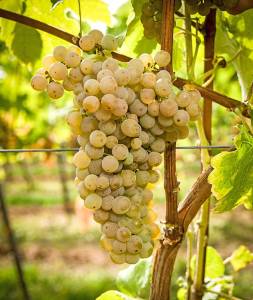 The white grape variety cultivated at the Julius Kühn Institute with pleasant exotic fruit aromas is resistant to several pathogens.
The white grape variety cultivated at the Julius Kühn Institute with pleasant exotic fruit aromas is resistant to several pathogens.
(Siebeldingen) Vine breeding takes time. This also and especially applies to the new grape variety Calardis Musqué. It was crossed in 1964 at the Geilweilerhof in Siebeldingen from Bacchus and Seyval Blanc. 59 years later, the development of vine breeding at the Julius Kühn Institute (JKI), the Federal Research Institute for Cultivated Plants, has now been awarded plant variety protection.
Calardis Musqué is one of the so-called PIWI (fungus-resistant grape varieties). In addition to moderate resistance to powdery mildew, downy mildew and botrytis, it also has a high resistance to black rot. These properties mean that significantly fewer pesticides have to be applied during cultivation - an important step towards more sustainable viticulture and also essential for organic cultivation.
copyright Julius Kühn Institute
Lively acidity and exotic fruit notes
The wines from Calardis Musqué are sensory. The grape variety stands for a delicate muscat note reminiscent of Traminer in combination with exotic aromas such as mango, passion fruit, grapefruit and gooseberry. The lively acidity makes the wine very appealing and gives it the necessary depth. During the long test period and independent of the environmental conditions, the high quality of the wines has proven to be extraordinarily consistent. In the annual blind tastings at the Geilweilerhof in Siebeldingen, which are organized by the JKI Institute for Vine Breeding, it became the favorite of the guests.
Calardis Musqué is somewhat more demanding to cultivate than other new breeds due to its stingy grape formation and tendency to trickle down. However, the increased effort in the vineyard and the possibly reduced yield depending on the weather are rewarded by the consistently high quality of the wines.
The variety has been classified for cultivation in the Federal Republic of Germany since 2021. Interested wineries can obtain the grape variety from selected vine growers. Your name refers to a historical name for the Geilweilerhof, Calardiswilre.
Wines from the new variety are in wine sale of the JKI already available: https://www.julius-kuehn.de/zr/weinverkauf/
Photos are available for download at: https://www.julius-kuehn.de/pressemitteilungen/pressemeldung/news/pi2023-2-piwi-rebsorte-calardis-musque-erhaelt-sortenschutz/
Scientific contact
dr Oliver Trapp
Julius Kühn Institute, specialist institute for vine breeding Geilweilerhof
76833 Siebeldingen
Telephone: 06345/41-118
E-mail: oliver.trapp@julius-kuehn.de
Best regards from the press office
John Kaufman
press officer
Press office in Quedlinburg and Braunschweig
Julius Kühn Institute (JKI)
Federal Research Institute for Cultivated Plants
Follow us on Twitter: https://twitter.com/JKI_Bund
Subscribe to our newsletter: https://www.julius-kuehn.de/newsletter-des-jki/
The Julius Kühn Institute (JKI) unites 18 specialist institutes at nine locations in Germany under one roof. Headquarters is Quedlinburg. Other locations are Braunschweig, Berlin, Kleinmachnow, Dresden, Dossenheim, Münster, Siebeldingen and Groß Lüsewitz. The Federal Research Institute for Cultivated Plants is one of four research institutes of the Federal Ministry of Food and Agriculture (BMEL).

